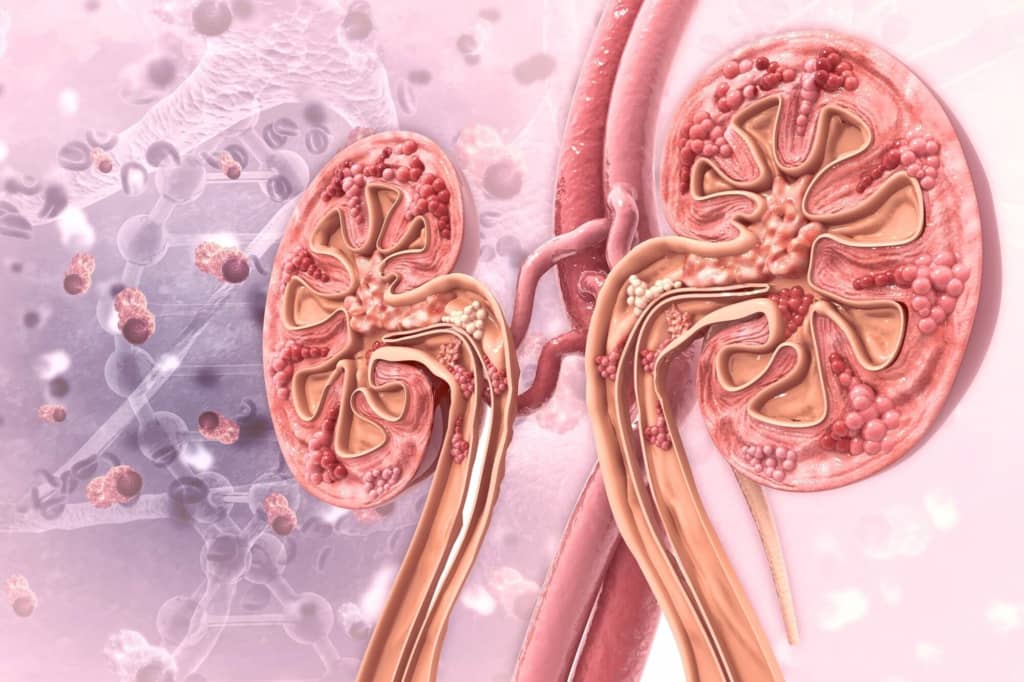Contents
- 1 What Is Diabetic Kidney Disease (DKD)?
- 2 How do kidneys work?
- 3 Types of Kidney Diseases
- 4 How Diabetes Affects Kidneys?
- 5 What Is Diabetic Nephropathy?
- 6 Diabetic Kidney Disease Symptoms
- 7 Causes of Diabetic Kidney Disease
- 8 Diabetic Kidney Disease Risks Factors
- 9 Complications of Diabetic Kidney Disease
- 10 Treatment of Diabetic Kidney Disease
- 11 Ways To Keep Your Kidneys Healthy
- 12 A Word From Mantra Care
What Is Diabetic Kidney Disease (DKD)?
One out of every ten diabetic patients suffers from kidney problems. Diabetic Kidney Disease is a kidney disease that occurs as a result of one of the complications of diabetes. Kidneys are relatively more prone to damage when a person has diabetes.
To understand the effects of diabetes on kidneys, you first need to be aware of what functions do kidneys do in your body.
How do kidneys work?
The first and foremost job of kidneys is to filter wastes and extra water out of your blood. Eight liters of the total blood in the body pass through the kidneys between 20-25 times a day, which implies that kidneys filter 180 liters of blood in 24 hours.
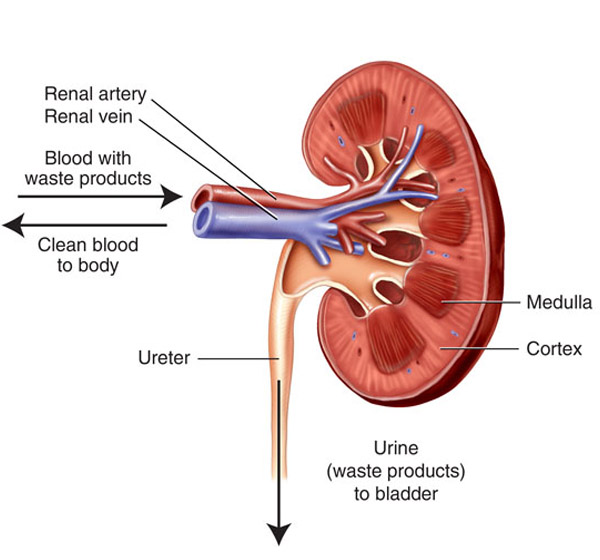
They are also responsible for 3 major functions of the human body:
- Regulating the fluid levels,
- Keeping a track record of the passage of vitamins and minerals.
- Formulating the hormonal discretions and balancing in the body.
Types of Kidney Diseases
Chronic Kidney Disease
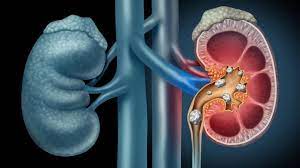
It is one of the most common kidney diseases, and its major cause is high blood pressure. As we know that constant blood processing is one of the kidneys major and they need to work on about 20% off the total volume of blood every minute. And so the high pressure in the blood flow is dangerous for kidneys, specifically to glomeruli which is the functional unit kidney.
Kidney Stone
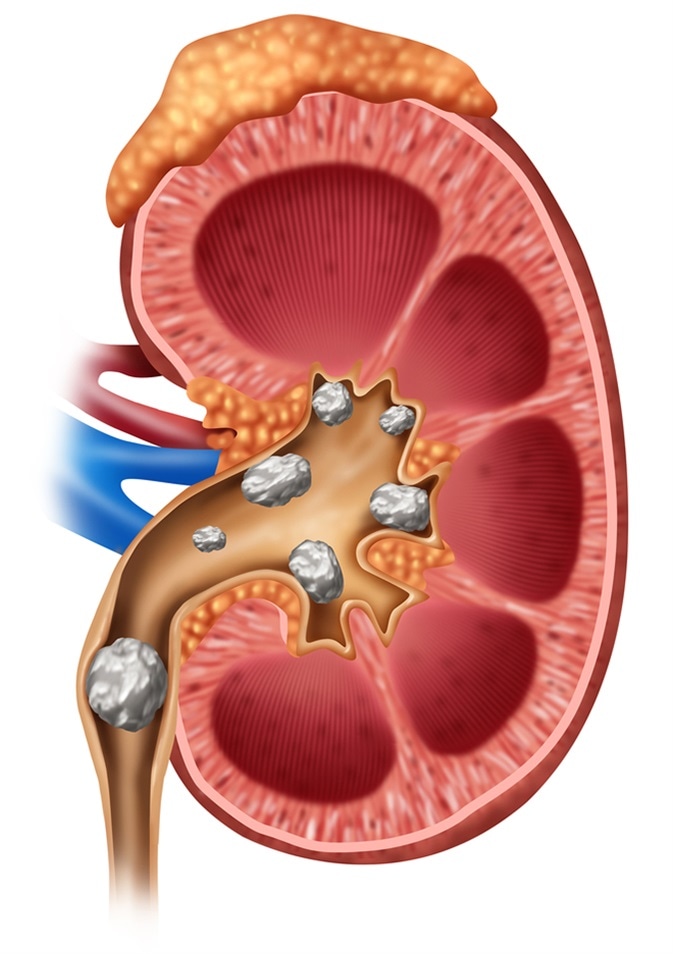
We eat a variety of food. Minerals and other substances in the blood accumulate kidneys and form small and solid particles called Kidney stones. In minor cases, Doctors recommend drinking as much water as you can so that the stone flushes out through the urine.
However, depending upon the size of the stone, they also suggest you operate and extract out the stones from your kidneys.
Glomerulonephritis
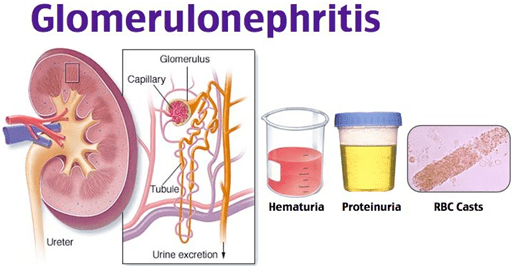
It is the name of an inflammation caused in the functional unit of the kidney called glomeruli. the function of the glomerulus is to filter the blood. The disease Glomerulonephritis can be the cause of certain infections drugs, autoimmune and congenital disorders.
Polycystic Kidney Disease
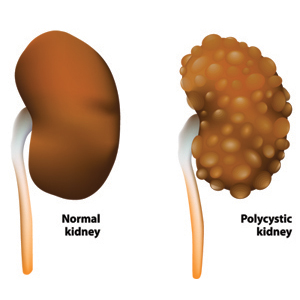
Usually, kidney cysts are harmless but Polycystic kidney disease is a way more serious condition. basically, a genetic disorder that causes this to grow on the surface of the kidney or inside it.
Urinary Tract Infection
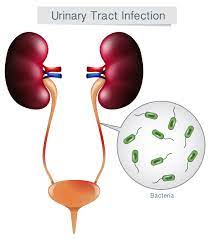
This can occur in any part of your urinary system and it occurs due to some bacterial infections. Two of the most common parts in which it occurs are the bladder and urethra.
So there are some easy treatments available for it but in case it is left untreated the infection can proceed towards the kidney and lead to kidney failure also.
How Diabetes Affects Kidneys?
When diabetes hits a person, kidneys are adversely affected too. Priorly, if you are a diabetic, three of your internal organs will be affected:
- blood vessels,
- nervous system,
- and urinary tract.
Let’s understand them one by one:
Blood vessels run throughout our body and have a lot to do with the kidneys too. They act as the filtering units of kidneys. Any sort of obstruction and clogging in the working of blood vessels can cause kidney damage which can be a fatal action.
For a diabetic, fluctuations in blood sugar level make the blood vessels narrow and hamper their elasticity. Due to this, less blood and oxygen gets supplied throughout the body. This increases the risk of high blood pressure and damage to blood vessels.
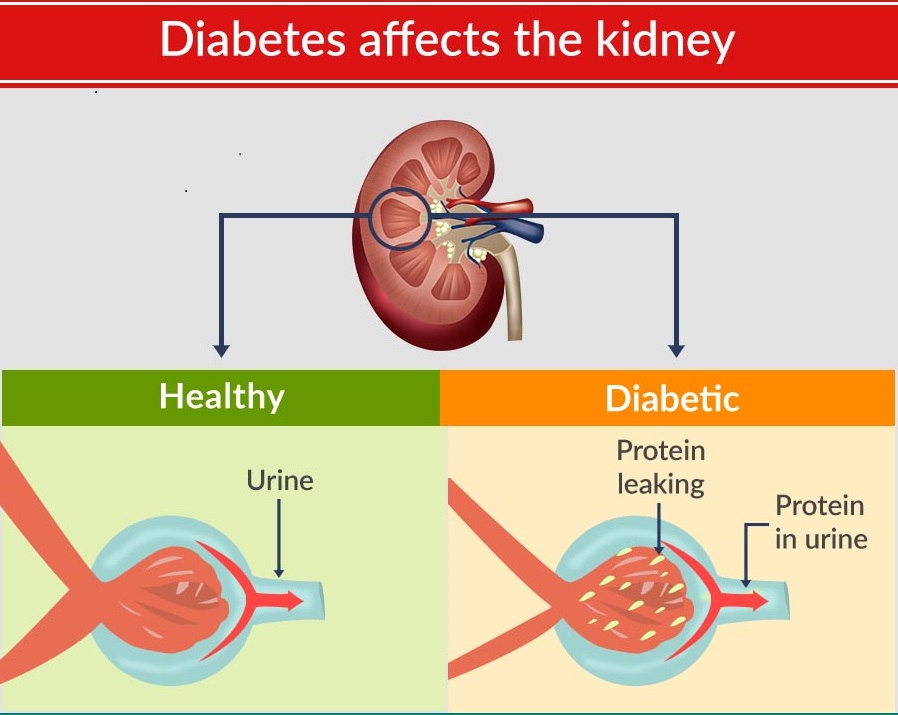
The nervous system is spread throughout the body to regulate the process of sending and receiving messages to the different parts. Diabetes can cause big harm to the nerves in the kidneys as high blood sugar levels cause injury to them.
Damage caused to your nerves from diabetes can leave them unable to receive messages from your brain.
For instance, if the nerves are unable to send the message about a full bladder to your brain then the pressure from a full bladder can cause damage to your kidneys.
Diabetes is a leading cause of Urinary tract infections, sexual dysfunction, and various other issues related to the bladder.
If the urine in the bladder stays there for longer it can lead to different urinary tract infections because of the bacteria in the urine. It also has a negative impact on the sensory functioning of the body.
What Is Diabetic Nephropathy?
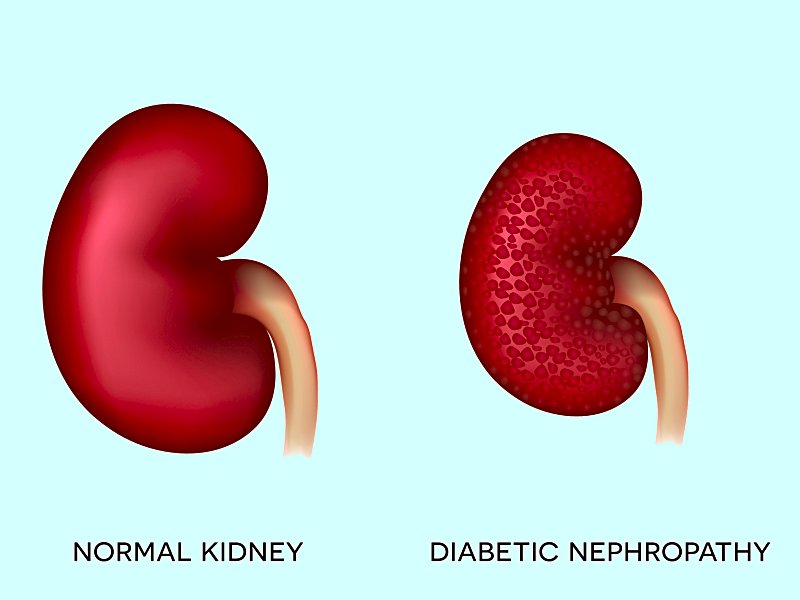
It is another name for Diabetic Kidney Disease (DKD). Diabetic nephropathy is a serious chronic disease that disables the kidneys to remove the waste from the human body. 25% of diabetics inherit this disease if they do not follow a healthy lifestyle.
The other name of diabetics nephropathy is kidney diabetes. As the most dangerous result, your kidney may fail, which is also called end-stage kidney disease.
Stages of Diabetic Kidney Disease
There are 4 stages of DKD or Diabetic Nephropathy categorized on the basis of Glomerular Filtration Rate (GFR). GFR is nothing but the most important function that your kidneys need to perform, which is to filter the blood. Usually, in a normal body kidneys have a GFR of 100. The kidneys’ functions happen to decrease in Diabetic Kidney Disease, so the stages of damage are:
Stage 1: It is the gentle and merciful stage of the disease where the kidneys can be restored for their proper functioning through treatment. At this stage, the GRF is above 90%
Stage 2: The damage to the kidney is moderate and GFR is 60%. At this stage, the doctor does not diagnose kidney disease.
Stage 3: When GFR of 15-60%, kidney disease is diagnosed.
Stage 4: If the GFR goes below 15%, then it’s a complete kidney failure.
Diabetic Kidney Disease Symptoms
It so happens that in the early stages, you might not get to notice the symptoms of the disease. But once the disease has reached later stages the symptoms are quite evident and clear. Some of the symptoms that you might notice while suffering from Diabetic Kidney Disease are:
- Uncontrollable blood pressure
- Excessive protein in the urine
- Swelling in some parts of your body such as feet, ankles, hands, or eyes.
- Increased urge to urinate
- Fatigue
- Itching
- Nausea and Vomiting
- Loss of appetite Sense of confusion
- Difficulty in concentrating
It is to be noted that the symptoms of kidney disease are not prominent only for DKD. Rather, you can witness the symptoms in some other diseases as well.
Causes of Diabetic Kidney Disease
If you look at the number of cases of the disease, two-thirds of them occur due to:
- Diabetes (High Blood Sugar): Developing diabetes before the age of 20 can also make you inherited diabetic nephropathy faster as compared to others.
- Hypertension (High Blood Pressure): Unregulated blood pressure or possessing high blood pressure is one of the most common causes of diabetic Kidney Disease
- Heavyweight: Having a higher BMI can also be a big cause of diabetic nephropathy that comes along with other diseases like obesity, hypertension, cardiovascular problems, etc.
Some other causes are:
- Pyelonephritis: It a resurrect kidney infections
- Vesicoureteral: It is a condition that allows urine to store in your kidneys.
- Enlarged prostate, kidney stones, and Cancers: These cause persistent obstruction in the urinary tract.
- Glomerulonephritis: a condition that inflames the kidney’s filtering units, called “glomeruli”.
Diabetic Kidney Disease Risks Factors
Factors that contribute even more to the risk of DKD are:
- Certain communities such as African-American, Native American, or Asian American.
- Hereditary
- Old age
- Disorder in kidney structure
- Obesity
- Smoking
- Cardiovascular disease
Complications of Diabetic Kidney Disease
Kidney disease holds the power to destroy almost all of your body parts. Potential destruction includes:
- ESRD (End-Stage Renal Stage)
- Decreased immunity
- Swelling in lungs, arms, and legs due to fluid retention.
- Weak bones and bone fractures.
- High blood pressure
- Anemia
- Erectile dysfunction
- Decreased sex drive
- Reduced fertility
- Pregnancy complications (risks for both, mother and fetus)
- Damage in your central nervous system
Prevention of Diabetic Kidney Disease
Reduce the risk of developing diabetic kidney disease by:
- Regulating your diabetes: If your diabetes is being regulated properly or if you are managing your high blood sugar levels, then the chances of developing Kidney Disease decreases.
- Managing your blood pressure: Keeping your blood sugar level close to normal is very important because and regulated high blood pressure contributes a lot more to kidney diseases
- Being careful with over-the-counter medicines: People often rely on painkillers such as aspirin, Advil, Motrin, and some others when they are going through muscle cramps or even a headache. But they hardly know the ill effects of such types of non-prescription pain relievers. You must have a look at the instructions given on the packages of such medicine. Moreover, if you are already a diabetic patient taking such kinds of medicines can result in even worse conditions for you.
- Managing your weight: Being overweight or obese is never favorable for your body conditions and their functions. This is one of the key routes from where almost every ailment takes birth. Indulge into some weight loss activities on a daily basis and keep Count On Your calories. make sure you are burning the number of calories you are taking in.
- Quitting smoking: Cigarette smoking is injurious to health. It’s no secret to any of us. This causes damage to your Kidneys and if you already have a pre-existing Kidney Disease you better look for ways or strategize for quitting smoking. There are some support groups counseling and medications out there that help you quit smoking
Treatment of Diabetic Kidney Disease
When it comes to the treatment of diabetic Kidney Disease there are no permanent fixes for it. but there are ways through which you can bring your blood sugar levels down in order to decrease the inflammation in the Kidneys.
In case the state of your Kidneys keeps getting progressively worse and you reach end-stage renal disease a Sadi then the doctor might suggest invasive treatments like dialysis.
Medications for Diabetic Kidney Disease
Using the recommended dosage of insulin and maintaining the blood sugar levels close to normal can help with diabetic nephropathy. If you have a family history of Kidney Disease then you must keep up with your doctor’s appointment and take precautions to prevent yourself from the world.
Dialysis For Diabetic Kidney Disease
In some unfortunate cases, it gets worse with time and the patient suffers from ESRD, that is, end-stage renal disease. At this stage, there are only two options left in front of the patient either to go for dialysis or for a kidney transplant. The doctor will suggest the right course of treatment for your disease.
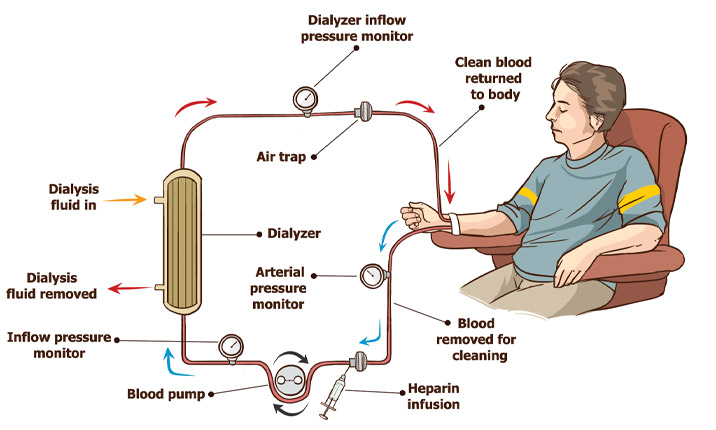
Dietary and Lifestyle change diabetes is either a consequence of or asymptomatic of obesity. and weight reduction is the only option left before the patients. and this will change your health and body function for good.
It’s true that you cannot completely eradicate the damage that has already been done but you can make sure that there is no distress caused to your kidney.
Ways To Keep Your Kidneys Healthy
Below are some of the key points that can keep that fist-sized organ, kidney healthy.
- stay fit and active
- keep your blood sugar level is close to normal
- monitor your blood pressure level
- have the habit of drinking plenty of fluids
- monitor your weight to have a healthy BMI
- don’t smoke
- better avoid otc ( over the counter) pills
- have regular screening for your Kidneys.
A Word From Mantra Care
If you are looking for more information on this topic or on Diabetes treatment, Online Therapy, Hypertension, PCOS treatment, Weight Loss, and Physiotherapy, please visit mantracare.org or feel free to reach out to us at +91-9711118331 or email at contact@mantracare.org. You can also download our free Android App or IOS app.
Here at Mantra Care, we have an incredibly skilled team of health care professionals and coaches who will be happy to answer any questions and provide further information so you know what’s best for your unique needs.
